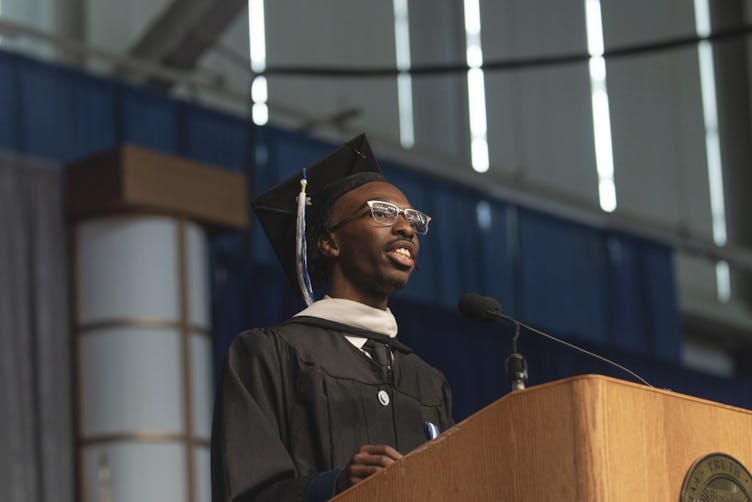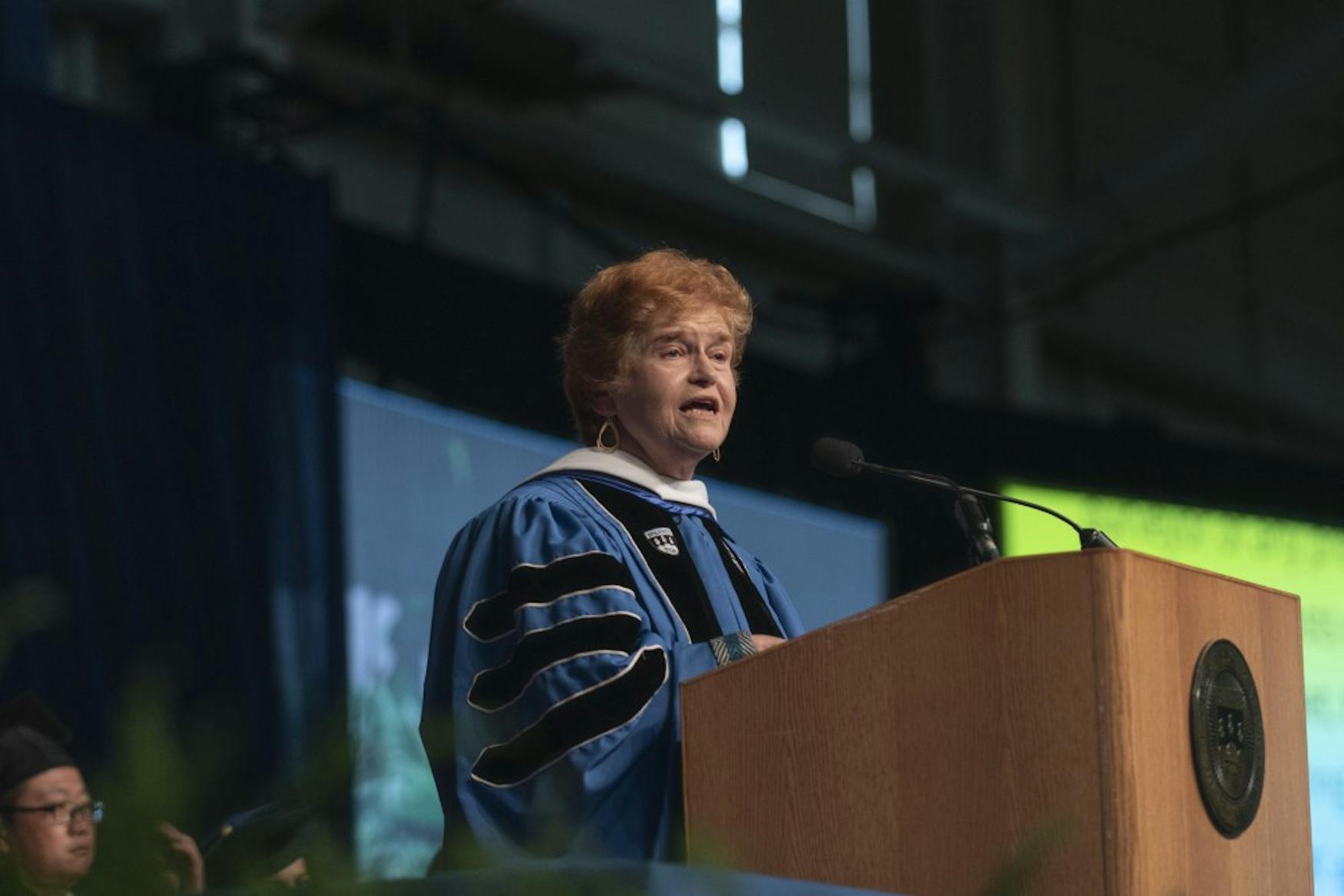Deborah Lipstadt advises grads to combat prejudice
Lipstadt talked about the importance of standing up to anti-Semitism and other forms of prejudice.
Deborah E. Lipstadt MA ’72, PhD ’76 took the stage at Brandeis’ 68th Commencement Exercises on May 19 to both congratulate the graduating Class of 2019 and warn them about the changing world around them. “I should send you on your way in a positive and upbeat passion. I should challenge you with the prophetic words, ‘may you dream dreams and see visions.’ And yet, I shall not do that … because the moment and the situation we are current facing demands much more than that,” she said. “Today I stand before you concerned, worried, and dare I say it, … truly frightened about the future.”
As a Holocaust scholar and author, Lipstadt said, “I approach this topic from the perspective of a life-long study of anti-Semitism and its terrific impact.” She explained that while certain hateful sentiments are not new, “the haters feel emboldened, free to express and celebrate their contempt for others.”
Lipstadt said that, like racism and homophobia, anti-Semitism is born out of prejudice. She discussed how prejudice affects racism and anti-Semitism, explaining that racism against Black and Brown people takes the form of white people seeing these groups as inferior and dangerous. “The racist punches down to prevent this assault from below,” Lipstadt said.
She continued, “The anti-Semite punches up to prevent that assault from above,” Lipstadt continued. She explained that anti-Semitic people see Jews as the manipulative group behind the “white genocide,” describing anti-Semitism as a “conspiracy theory.” As an example, she highlighted the 2017 Charlottesville rally, where white supremacists chanted, “Jews will not replace us.”
Lipstadt elaborated that the political left and right unite over anti-Semitism. She pointed out that David Irving, a Holocaust denier who sued her in 1996 for libel and who helped Ku Klux Klan Grand Wizard David Duke write his memoir, said he was “impressed” with Jeremy Corbyn’s leftist Labour Party. According to Lipstadt, Irving and Corbyn have “nothing in common except for overt and unrelenting anti-Semitism.”
Lipstadt said that while political leaders should be the ones standing against hate, those actually willing to do so are “few and far between.” As a result, she said, “We must fight from the bottom up.”
Lipstadt emphasized the importance of standing against other prejudices in addition to anti-Semitism. “We cannot be against just one ‘-ism’ to the exclusion of all others. If we are going to fight prejudice, we must fight it across the board. We cannot be a fighter against anti-Semitism but be blind to racism, or even worse, engage with it ourselves.”
She continued, “The Jew in the kippa, the Muslim in the hijab, the African American student walking across campus, the Latino kids gathered … in a park must feel as safe as anyone else.”
Lipstadt encouraged the graduating class to use their Brandeis education to “repair the world.” She concluded, “We hope you will do well, but we pray you will do good.”
Similarly, University President Ron Liebowitz’s remarks addressed themes of anti-Semitism and social justice. He recalled Brandeis’ founding by the American Jewish community in 1948 for the purpose of creating a place for marginalized communities in higher education.
In addition to describing Brandeis’ history of social justice, Liebowitz emphasized the class of 2019’s commitment to addressing the world’s problems. “Today’s graduates, more than any other cohort of students since the 1960s, are intensely aware of the great challenges facing them and future generations,” he said.
Liebowitz continued, “Whether it’s criminal justice reform, inequality, failing public schools, the impact of climate change, refugee immigration rights or any number of issues that represent great challenges to society, it is this generation — your generation — that gives us the greatest hope.”

‘CLASS OF 2019, LET’S MAKE THINGS HAPPEN’: R Remi Matthews ’19 delivered the undergraduate student address.
R Remi Matthews ’19 delivered the undergraduate student address, dedicating it to “the ones who did the impossible thing, the ones who did the unthinkable.”
In his speech, he reminded the graduates of their potential, telling them, “You are powerful beyond measure. And as you set forth into the real world, as people like to call it, remember that you’re far more prepared than you think.”
Matthews admitted, however, that he had not always taken that mantra to heart. When he first took computer science classes, namely COSI 11a, he felt a sense that he could not code as well as everyone else and that his colleagues and peers did not think he was knowledgeable about his work. “Throughout my time at Brandeis, I had to constantly validate my prowess in the spaces I entered,” he said. “Everyday felt like an uphill battle, and I was growing more and more tired.”
A change in how he looked at his life altered his outlook on his academics and got him out of a dark place. Matthews now views his life through the lens of the “butterfly effect,” which stipulates that “one small change in one moment can result in vastly large differences in a later moment.” He cherishes small moments, like laughing at The Stein, and weights them more significantly. “It’s these little moments that may or may not seem significant at the time, that prepared you” for other moments in your life, Matthews said.
In the final part of his speech, Matthews thanked his mentors who helped him get to where he is today. “Whether it was navigating the space physically, emotionally or academically, I thank each of you. Without you guys I wouldn’t be able to see the strength I had within myself,” he said, addressing previous student Commencement speakers from the past three years who were in the room.

‘I WILL BE FOREVER GRATEFUL TO BRANDEIS’: Akash Kalra MBA ’19 delivered the graduate student address.
Graduate student speaker Akash Kalra MBA ’19 took a different approach with his speech, stressing that being a Brandeis student has improved his life immeasurably. “Brandeis has given me every single thing that I aspire to. It has made my life dream come true. More importantly, it has given me the self confidence that I always lacked,” he said.
Coming from a small town in India, Kalra explained that did not have many opportunities to pursue the type of learning that the University offered. At Brandeis, he enjoyed the “engaging” teaching styles of the professors and praised their willingness to help him. Thanks to Brandeis, he also found career opportunities in multiple cities and countries that he had once only dreamed of visiting, he said.
Kalra also said he found an “intimate” community at the University. “Not even once did I feel out of place … I found my home away from home in Brandeis,” he said.
According to a BrandeisNOW article, 881 undergraduate students, 294 Heller School for Social Policy and Management graduate students, 233 Heller School for Social Policy and Management graduate students, 270 Graduate School of Arts and Sciences students and 177 Rabb School of Graduate and Professional Studies graduate students received degrees.




Please note All comments are eligible for publication in The Justice.